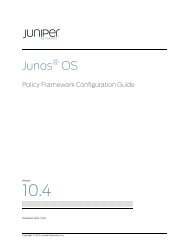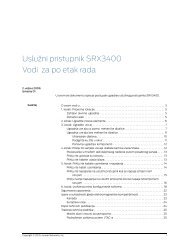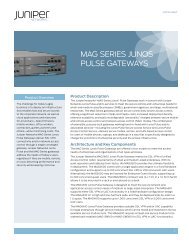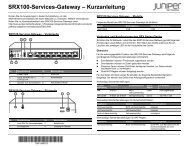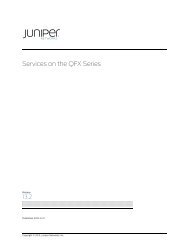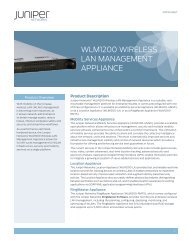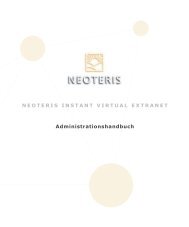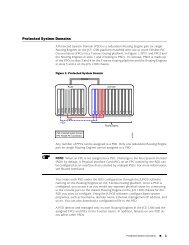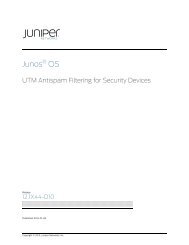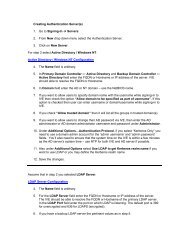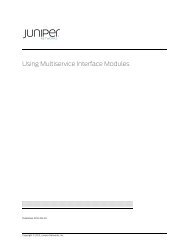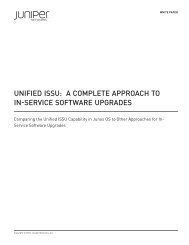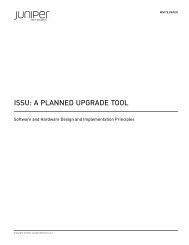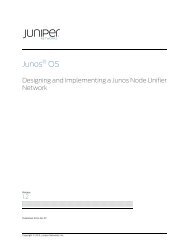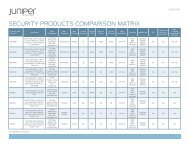6.3.0r10 Release Notes - Juniper Networks
6.3.0r10 Release Notes - Juniper Networks
6.3.0r10 Release Notes - Juniper Networks
Create successful ePaper yourself
Turn your PDF publications into a flip-book with our unique Google optimized e-Paper software.
ScreenOS 6.3.0 <strong>Release</strong> <strong>Notes</strong><br />
16<br />
• Allows the user to configure the hold-interval option of policy installation using the<br />
Routing<br />
following CLI command:<br />
set policy install hold-interval seconds<br />
The default value is 5 seconds. The minimum is 0 and the maximum is 10. This<br />
command specifies the maximum time interval between when policy configuration<br />
occurs and actual policy installation begins. When the user creates a new policy or<br />
modifies an existing policy, the policy installation is delayed by up to the value of<br />
hold-interval value specified. This allows the system to more efficiently process the<br />
session table by handling several updates at once or by reducing the thrashing caused<br />
by extremely rapid updates.<br />
unset policy install hold-interval<br />
The unset command resets the default value of hold-interval.<br />
Example: To configure hold-interval option to 2 seconds:<br />
set policy install hold-interval 2<br />
• IRDP Support for All Platforms—Beginning with ScreenOS 6.3.0 release, ICMP Router<br />
Discover Protocol (IRDP) support is available on all platforms; however, IRDP support<br />
is available only on an Ethernet interface with an IP address.<br />
• DSCP Marking for Self-Initiated Traffic—The administrator can configure the DSCP<br />
value for traffic initiated by the security device. The DSCP value can be configured for<br />
11 services: BGP, OSPF, RIP, RIPNG, TELNET, SSH, WEB, TFTP, SNMP, SYSLOG, and<br />
WEBTRENDS. You can use both the CLI and the WebUI to configure DSCP marking.<br />
• QoS Classification Based on Incoming Markings—In ScreenOS 6.3.0, traffic-shaping<br />
policies are enhanced to support quality of service (QoS) based on the IP precedence<br />
and Differentiated Services code point (DSCP) marking of incoming packets. The QoS<br />
classification feature for incoming traffic works only if the traffic-shaping mode is set<br />
to Auto or On.<br />
Security<br />
• Denial of Service Attack Defenses—ScreenOS 6.3.0 supports the feature of strict<br />
TCP-SYN-check wherein a strict syn check is applied to all the packets in a TCP<br />
three-way-handshake before the three-way handshake completes. Users can enable<br />
this feature by using the set flow tcp-syn-check strict command.<br />
• Verification of IP address in ASIC Whitelist—Beginning with ScreenOS 6.3.0, users<br />
can verify if a specific IP-address is in the ASIC whitelist by using the get asic ppu<br />
whitelist ip-address command.<br />
• Support for SecurID Server Cluster—RSA supports a primary server and up to 10 replica<br />
servers to process authentication requests. At least one of primary or slave servers<br />
must be configured with static IP. RSA SecurID Server Cluster supports the name<br />
locking, load balancing, and failover functions.<br />
Copyright © 2012, <strong>Juniper</strong> <strong>Networks</strong>, Inc.



